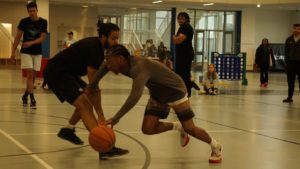Let the Games Begin
December 6, 2021
There are 30 seconds left on the clock. His team desperately needs a play to win the round. Pressure mounts. Fifteen seconds left, and a clutch shot was made, the round won. The players all rise in celebration to congratulate their teammate for the game saving play.
This is a sport that requires great discipline, intelligence, cat-like reflexes, and strategic thinking.
The players constantly need to be up-to-date on the newest strategies and aware of how their game evolves. This often involves training for hours to improve their reflexes and awareness. No days off.
Being able to analyze what’s happening during a game is a major key to success. They need to be able to process what’s happening and formulate a new plan on the spot. This is why film study is key. This allows the players to study their opponents and help them gain an edge over their opponent. Meanwhile, their opponents are doing the same thing.
The players adhere to a strict practice schedule to be ready for games. The practices are divided into blocks. They have times for solo work, where the players focus on improving their own skills. Other forms of practice include team drills and activities. These typically include scrimmages against their own teammates. Mixed in among these is physical training. These schedules vary the closer they get to the game.
A vital piece to developing these skills is the coach. He makes sure that his team is ready to go for games. The coach is responsible for developing strategies to be used during the game. Coaches act as the leaders, strategists, and mentors of the team. They are responsible for making sure that any and all issues with the team are resolved before the game.
All of this is what it takes to make an esports team.
Yup, esports, a competitive multiplayer video game. Games like Fortnite, Overwatch, and more recently, Valorant, have dominated the world of esports with teams worldwide playing them. These teams all have coaches and practice schedules to keep them ready to play. These teams recruit players, and those players have the chance to get paid like other professional athletes. Those chances come from participating in professional matches and tournaments.
The Central Connecticut State University is having more trouble with their esports program than other university; they don’t have an official team. Instead, students have formed unofficial groups and are attending competitions on their own. “I believe all of our teams are operating independently and competing in ECAC intercollegiate tournaments,” said Nick Streifel. Adding to the problems, there is no coach. The previous esports coach left CCSU over the spring, leaving the university without one. This is an important aspect when it comes to building the esports program.
So, if there is no coach or esports team, then what is going on with the esports at CCSU? As said before, some members of the esports team have been participating in events independently from the university. Many of the members of the previous team have left the university. All of this has contributed to some uncertainty about the team and whether or not it can be competitive.
Matthew White, a veteran of CCSU esports, having started out with the Overwatch team, but recently had to learn a new game. “In the past semesters, I was on the Overwatch Team for CCSU, but as of spring 2021, I have since switched over to playing for our new Valorant team,” he said. He knows what it takes to compete at a high level in the world of esports. That is only one side of the story though. When White is not in competition, he is also a student. This requires him to strike a balance between increasing his gaming prowess and academics.
Since the Valorant team is new, White spoke mainly on his experiences with Overwatch. Typically, practices are two to three times per week, later at night, and typically go for a few hours. The practices take place at night because of the players’ academic obligations. “College education still comes first,” White said. “Practices can vary from playing in a scrim setting against other teams of similar levels.” This is the most common form of practice for esports players. These scrimmages help improve their physical and mental skills.
Another form of practice is watching VODs – recordings of individual players or other teams that the team studies. This is essentially film study much like other athletes do. “These help in determining where we need to improve while learning how other teams play,” White said.
Even though the teams have official practice times, they still try to go the extra mile. When time presents itself, the players will do extra practices. This helps build a relationship between the players. “After a semester or two of playing with a particular set of CCSU students, you really begin to hang out with each other both on and off of campus to know each other even more,” he said. Increased interaction helps the players learn more about each other and build trust. “This is a major help as we learn to trust each other within the games,” he said.
When asked about game day, he gave the usual answer you would get from an athlete. “When game day comes around, we give it our all against the teams we face and see it as a learning opportunity regardless of when we win or lose,” he said. Sounds just like any other athlete, right?
Another aspect that White spoke about was teamwork. It is one of the most important aspects of not just esports, but most sports in general. Being on the same page as his teammates was something that White emphasized. “Teamwork is a major key component in these games which often can determine an early win or a hard-fought loss,” he said.
White gives a great look into the world of an esports player, but only for games such as Overwatch and Valorant. There are other games like Super Smash Bros, RAINBOW Six: Siege, and Hearthstone that have teams associated with them. Each of these games has its own separate practice and way of playing. “We still do have a Hearthstone and RAINBOW 6: Siege teams that compete against other schools within ECAC,” he said. And still, even more games could be added, thus expanding the possibilities for new teams and new players. Due to the popularity of video games, esports shows no signs of slowing down anytime soon.
How does the schedule of an esports player compare to another athlete such as a football player? Surely a lot of people would wonder about that. Most would assume that the schedule of a football player is more intense and rigorous than an esports player. Dexter Lawson Jr., a CCSU junior and member of the football team, helped to provide some context.
On Monday and Wednesday, Lawson gets up at 5:15 a.m., followed by a team meeting at 6:00 a.m. Following that is the weight room starting at 8:00 a.m. After that, he goes to classes. Following his classes, he goes to practice at 12:20 p.m. The practices usually will last until 2:30 p.m. He then goes to classes again and finishes the day with another meeting at 7:30 p.m.
On Tuesday and Thursday, Lawson gets up at 6:00 a.m., followed by a meeting at 6:40 a.m. After the meeting, he goes to practice and the weight room. This starts at 8:20 a.m. and ends at 11:00 a.m. Following this, he goes to class and ends the day with more meetings at 7:30 p.m.
Friday and Saturday are dedicated to traveling and game day.
Despite the difference in their sports, both White and Lawson adhere to strict schedules. While different, they are dedicated to their craft and work to improve. One aspect does not change; they are both athletes.






